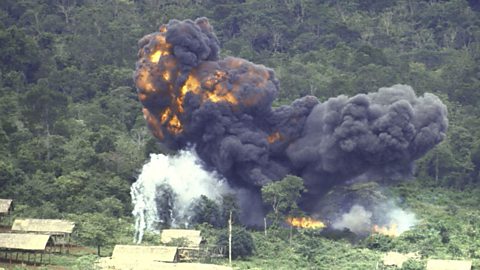Themes

The effects of the war in Vietnam is a key theme of the poem
A number of unifying ideas or themeCentral, unifying idea(s) that run through a text. run through the poem. Different readers may attach more or less significance to each of these themes, depending upon how they view the poem.
| Theme | Evidence | Analysis |
| War: the poet explores the effects of war (specifically the Vietnam war) on a nation and its people. | 'When bombs smashed those mirrors/ There was time only to scream.' | The harsh realities of war are exposed by the image of bombs being dropped into the paddy fields and the sound of people dying. |
| Culture: different aspects of a culture are explored in the various questions and responses ā art, literature, music, language, religion, technology. | 'It is not remembered.' | This repeated phrase in the second section of the poem emphasises that many aspects of the Vietnamese culture have been lost or forgotten. |
| Anger: the calm responses of the responder seem to be at odds with the rage that might naturally be felt at what has taken place. The anger is supressed. | 'Sir, laughter is bitter to the burned mouth.' | The poet's underlying anger at what has taken place is made clear by the horrifying image and the alliteration (series of words that have the same first consonant sound) of 'bitter' and 'burned'. |
| Theme | War: the poet explores the effects of war (specifically the Vietnam war) on a nation and its people. |
|---|---|
| Evidence | 'When bombs smashed those mirrors/ There was time only to scream.' |
| Analysis | The harsh realities of war are exposed by the image of bombs being dropped into the paddy fields and the sound of people dying. |
| Theme | Culture: different aspects of a culture are explored in the various questions and responses ā art, literature, music, language, religion, technology. |
|---|---|
| Evidence | 'It is not remembered.' |
| Analysis | This repeated phrase in the second section of the poem emphasises that many aspects of the Vietnamese culture have been lost or forgotten. |
| Theme | Anger: the calm responses of the responder seem to be at odds with the rage that might naturally be felt at what has taken place. The anger is supressed. |
|---|---|
| Evidence | 'Sir, laughter is bitter to the burned mouth.' |
| Analysis | The poet's underlying anger at what has taken place is made clear by the horrifying image and the alliteration (series of words that have the same first consonant sound) of 'bitter' and 'burned'. |
Question
What does Levertov convey about Vietnamese culture and her feelings about it?
- The questions in the first block of the poem refer to different aspects of a culture.
- The answers reveal how war has destroyed or altered these aspects.
- The tone of the poem subtly conveys a sense of deep anger and sadness about this.